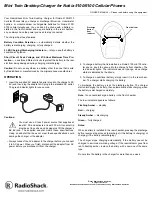
9
Only
use
approved
accessories.
Don’t
rely
on
your
phone
as
a
primary
device
for
emergency
communications.
FCC
RF
Exposure
Information
(SAR)
This
phone
is
designed
and
manufactured
not
to
exceed
the
emission
limits
for
exposure
to
radio
frequency
(RF)
energy
set
by
the
Federal
Communications
Commission
of
the
United
States.
During
SAR
testing,
this
device
was
set
to
transmit
at
its
highest
certified
power
level
in
all
tested
frequency
bands,
and
placed
in
positions
that
simulate
RF
exposure
in
usage
against
the
head
with
no
separation,
and
near
the
body
with
the
separation
of
10
mm.
Although
the
SAR
is
determined
at
the
highest
certified
power
level,
the
actual
SAR
level
of
the
device
while
operating
can
be
well
below
the
maximum
value.
This
is
because
the
phone
is
designed
to
operate
at
multiple
power
levels
so
as
to
use
only
the
power
required
to
reach
the
network.
In
general,
the
closer
you
are
to
a
wireless
base
station
antenna,
the
lower
the
power
output.
The
exposure
standard
for
wireless
devices
employing
a
unit
of
measurement
is
known
as
the
Specific
Absorption
Rate,
or
SAR.
The
SAR
limit
set
by
the
FCC
is
1.6
W/kg.
This
device
is
complied
with
SAR
for
general
population/uncontrolled
exposure
limits
in
ANSI/IEEE
C95.1
‐
1992
and
had
been
tested
in
accordance
with
the
measurement
methods
and
procedures
specified
in
IEEE1528.
The
FCC
has
granted
an
Equipment
Authorization
for
this
model
phone
with
all
reported
SAR
levels
evaluated
as
in
compliance
with
the
FCC
RF
exposure
guidelines.
SAR
information
on
this
model
phone
is
on
file
with
the
FCC
and
can
be
found
under
the
Display
Grant
section
of
www.fcc.gov/oet/ea/fccid
after
searching
on
FCC
ID:
SRQ
‐
ZTEA2021L.
The
FCC
ID
also
can
be
found
on
the
device





























